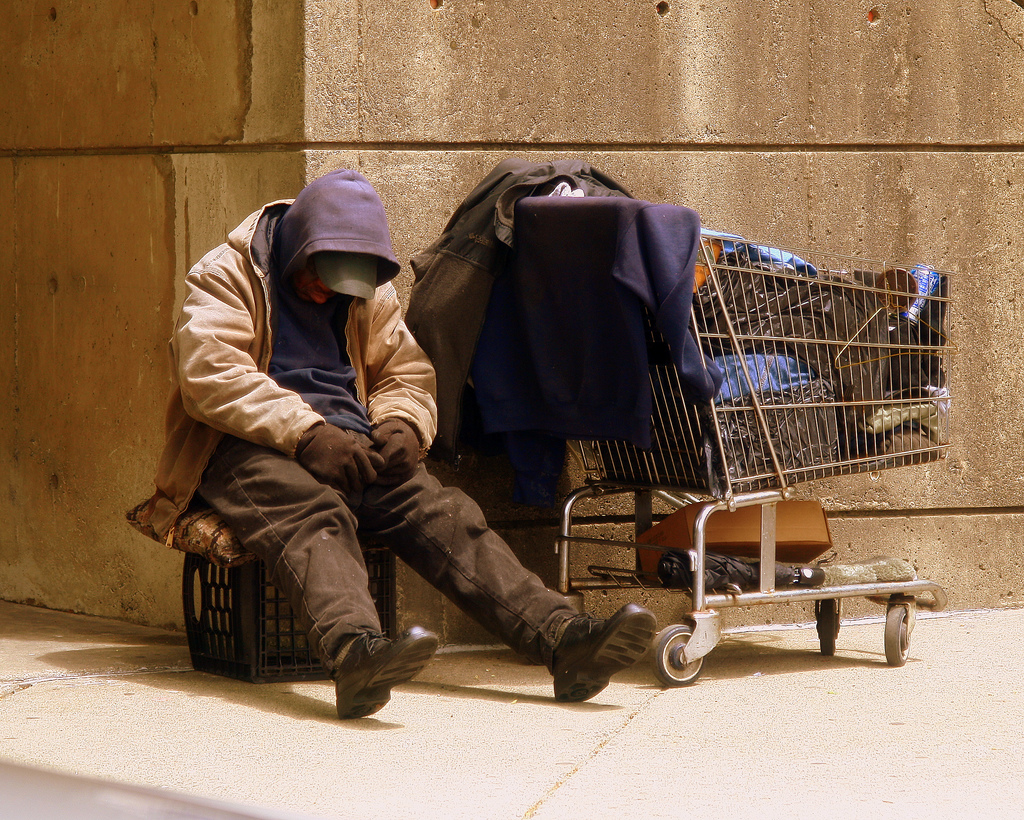
Angelisse Alvarez
Staff Writer
Staying home in order to slow the spread of COVID-19 is essential for those that live inside homes. But this is not an option for the homeless.
The homeless are highly vulnerable to COVID-19 and are susceptible to a larger spread of the virus due to their lack of proper housing and inability to social distance.
Homeless shelters and encampments pose the challenge of social distancing due to their closely shared spaces, including those designated for bathing, sleeping and eating. Supplies are often shared.
Shelters have closed in several states because of understaffing and an inability to achieve social distancing. Nationwide, 84 percent of unsheltered homeless people and 19 percent of sheltered homeless people have physical health problems.
Existing health issues heighten risks, and access to health care is another challenge for much of the homeless community.
Now that many businesses with restrooms have closed, a large fraction of the homeless community struggle more-so to maintain hygienic care such as bathing and frequent hand washing.
There are housing efforts being made across the country. In San Francisco, hotel rooms are housing those previously living in shelters. California opened over 15,000 hotel and motel rooms for people without secure housing. Motor homes and RVs are available to the homeless in Los Angeles.
However, a nationwide effort to provide housing is still in dire need. Monroe County lacks transitional housing programs.
Hand washing stations are available around cities such as Atlanta and Louisville, Ky. The nonprofit “Love Beyond Walls” is installing sinks around Atlanta and sending stations to cities such as Birmingham, Ala. and Austin, Texas.
The Pennsylvania organization “Familylinks” provides temporary housing for at-risk homeless youth.
Those experiencing financial burdens due to being laid off or having cut work hours could be driven to homelessness if mortgage or rent is not frozen nationwide for a longer period. All states have postponed evictions, but time constraints vary. In Pennsylvania, evictions are only banned until April 30.
Homelessness is also a reality for many college students.
“For a lot of them it’s couch surfing,” said Dr. Gene Kelly, Dean of student life. “It’s relying on the kindness of possibly extended family members to stay with for two weeks and then quickly pack up their bag. It’s students deciding to live in their cars because it’s cheaper for them to do that than paying for rent.”
Other students might have access to shelter, but no true stable place. Dr. Kelly considers this homelessness. “If they went home, they’d be living in a two-bedroom apartment with 7 other people. And they’d have to sleep on the floor in the corner on a sleeping bag,” he said.
“If they’re living in their car, they identify safer, better-lit parking lots to sleep. They know when gyms are open to shower. They know what events offer food, so sometimes they attend programs to eat. These are just some of the conversations I’ve had with students about how they navigate campus around their housing and food insecurity,” said. Dr. Santiago Solis, ESU’s vice president of Campus Life and Inclusive Excellence.
ESU allowed students experiencing home insecurity to stay on campus. Campus housing is limited and available until May 9. “The goal being for us to have the least amount of people here as possible, because the more students we have, the more students that might end up not socially distancing,” says Dr. Kelly.
ESU houses around 50 students.
“Our commitment to our students is also connecting them to local resources,” says Dr. Solis.
Dr. Kelly says he and social worker Bailey Higgins are assisting students in finding off-campus housing. “We’re working specifically with students who don’t have housing options, in terms of trying partnerships. I’ve been in touch with local motels to see what a monthly rate would be. If a student is not in a financial position to be able to afford that, then we are working with partners at the [ESU] Foundation who have been raising a significant amount of money through alumni and other donors to provide emergency assistance to students during this time.”
The ESU Foundation is providing students who apply with funds that will help them cover necessities such as food and housing.
Students in need of food will receive gift cards to local food resources. Students staying on campus who had a meal plan will receive weekly $100 gift cards to Giant.
“If a student didn’t have a meal plan, then they could again ask us for assistance and we would process that through the foundation dollars,” Dr. Kelly said.
There is an apartment share program in the works.
“We’re trying to put together almost like a room share or apartment share program where, if a student who was living off-campus in an area they’ve now left but still need to pay rent, would their landlord permit students to do a sublease for a student that wants to stay in the area or can’t go anywhere else, can we kind of pair them up,” Dr. Kelly said.
Bailey Higgins is researching new government, federal and state programs.
“Gene and several of us are going to converse about identifying resources to assist students on how to file for unemployment, if they’re assisting parents or families and in need of medical benefits or housing, rent, mortgage and utility forgiveness,” Dr. Solis said.
Student loan debt, interest and payments are halted from now until September.
“Because we are in contact with a number of them, some of our students are of course experiencing isolation and feel very disconnected. Some of them are experiencing depression, so for us that’s very concerning. Another goal that we have is to connect them to mental health services,” says Dr. Solis.
Dr. Kelly also wants students to know about 211. Students can dial 211 or visit their website and will be directed to local resources that aid those who are experiencing homelessness.
Email Angelisse at
aalvarez4@live.esu.edu

